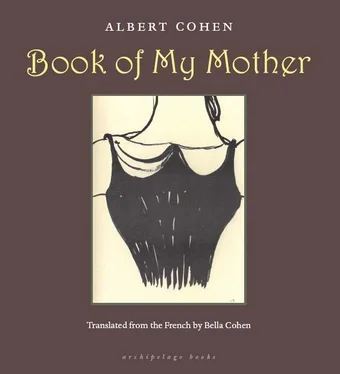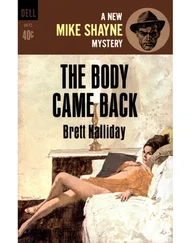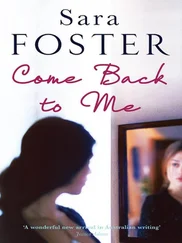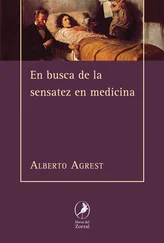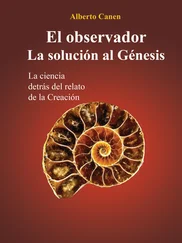I can see her now, hardly daring to breathe while the medical oaf pretentiously scribbled the prescription, which she saw as a talisman; I can see her making “shushing” gestures to prevent me from speaking while he was writing, to make sure I would not inhibit the inspiration of the great man in the throes of scientific travail. I can see her now, charmed, excited, girlishly showing him to the door and blushing as she sought an assurance that her little boy was not seriously ill. And afterward, how she sped off to ask the chemist, a lower but nonetheless highly esteemed divinity, to prepare the elixirs which she expected would have an immediate effect. My mother attached such importance to medicines. She loved to cram me with her own remedies, to give me the benefit of them, and she would not rest until I had swallowed the lot. “This is very strong,” she would say as she handed me a new potion. In order to please her, even when I was grown up, I had to gulp down all kinds of remedies for all kinds of organs and tissues. She would watch me take them with rapt, almost stern, attention. Yes, my mother was a simple creature. But all that is good in me I owe to her. And, since I can do nothing else for you, Maman, I kiss my hand, which came from you.
Your child died the day you did. Your death has suddenly transported me from childhood to old age. With you I had no need to pretend I was an adult. That is what lies in store for me now; I shall always have to pretend to be a grown-up, a serious person with responsibilities. I no longer have anyone to scold me if I eat too quickly or read too late into the night. I am no longer ten, and I can no longer play with cotton spools or stickers in a cozy room, far from the fog of the wintry street, near the yellow circle of the oil lamp and in your keeping, while studiously you sew and make sweet, vague, enchanting plans, poor creature born to be swindled.
O my past, my early childhood! O my little room, cushions embroidered with reassuring kittens, virtuous color prints, comforts and cream buns, herb teas, cough sweets, arnica, gas burner in the kitchen, barley sugar, old lace, smells, mothballs, china night-lights, little bedtime kisses, kisses of Maman, who would say, after tucking me up in bed, that I was now going to take a little trip to the moon with my friend the squirrel! O my childhood, quince jelly, pink candles, illustrated Thursday papers, plush teddy bears, joys of convalescence, birthdays, New Year letters on jagged-edged notepaper, Christmas turkeys, fables of La Fontaine idiotically recited standing up on the dining-room table, brightly colored sweets, waiting for holidays, hoops, diabolos, grubby little hands, grazed knees and I always pulled off the scab too soon, fairground swings, the Cirque Alexandre, where she took me each year and I would dream of it months in advance, new exercise books for the new school year, imitation-leopard-skin satchel, Japanese pencil boxes, multi-tiered pencil boxes, Sergeant Major nibs, Blanzy Poure bayonet nibs, bread and chocolate for tea, cache of apricot pits, plant-collecting box, glass marbles, Maman’s songs, lessons which she made me revise each morning, hours spent watching her cook with ceremony, childhood, little scraps of peace, little scraps of happiness, Maman’s cakes, Maman’s smiles, all this I shall know no more, O charms, O dead sounds of the past, vanished smoke and withered seasons. The shores recede. My death draws near.
WHEN I WAS EIGHTEEN I left Marseilles and went to Geneva, where I registered at the university and nymphs were kind to me. My mother was then quite alone. She was uprooted in Marseilles. She did have some relatives of a kind there, but they were excessively rich and invited her to their homes only to ram their opulence down her throat, boast of their grand connections, and ask patronizing questions about her husband’s modest business. After a few visits, she had stopped going to see them. Since her first heart attack, she had been unable to help my father in his work, so she spent most of the time alone in her flat. She saw no one, for she did not know how to make social contacts. In any case, the wives of my father’s business acquaintances were not her sort and probably did not like her. She could not laugh with those tradesmen’s wives, take an interest in matters which interested them, or talk like them. Since she had no other company, she sought the company of her flat. After lunch, when her housework was done, she would dress nicely and pay a call on herself. She would walk round her beloved flat, examine each room in turn, pat a bedspread, arrange a cushion, fondly survey her dining room, check to see that all was in order, and enjoy the general neatness, the smell of floor polish, and the hideous new stamped-velvet sofa. She would sit down on the sofa and receive herself in her own home. The glass-bowl coffeemaker she had just bought was a new acquaintance. She smiled at it, then put it a little farther away, to get a better view of it. Or else she looked at the fine handbag I had bought her, which she kept wrapped in tissue paper and never used, for it would have been a shame to dirty it.
Her life was made up of her flat, writing to her son, waiting for letters from her son, preparing for her visits to her son, waiting for her husband in the silent flat, welcoming him when he arrived, and being proud of his compliments. There were also the tearooms, where she listened to snatches of the conversation of fine ladies while she ate cake — the consolation of the lonely. She took part in things as best she could, humbly made do with such poor pastimes, ever a spectator, never a player. She would also go all alone to the cinema. The characters on the screen admitted her to their company, and she wept over the misfortunes of those beautiful Christian ladies. To the end of her days she lived in isolation, a timid child with her overplump face pressed hungrily against the window of the cake shop of social life. I do not know why I am telling of my mother’s sad life. It may be to avenge her.
At the table she would lay a place every day for the absent son. And on my birthday she would even serve the absent son. She would put the choicest morsels on the plate of the absent son, next to my photograph and a few flowers. For dessert on my birthday she would put on the plate of the absent son the first slice of almond cake — always the same kind of cake, because it was the one I had loved as a child. Then, with a trembling hand, she would pour Samos wine — always the same wine — into the glass of the absent son. She would eat in silence beside her husband, and she would gaze at my photograph.
AFTER I LEFT Marseilles, her big event each year was her stay with me in Geneva during the summer. She would prepare for it months in advance, patching up her clothes, buying presents, and going on an unsuccessful slimming diet. That gave her a kind of happiness long before her departure. It was a little trick she devised to feel that in a way she was already with me. During her visits, which were the great adventure of her life, she would try to curb her Oriental gestures and smother her accent, half Marseilles and half Balkan, under a confused murmur which was meant to sound Parisian. Poor darling!
She did not have much willpower. She was unable to keep to a diet, and her plumpness increased with the years. But each time she came to stay she assured me she’d lost several kilos since the previous year. I did not disillusion her. In actual fact, she starved herself for weeks before leaving Marseilles, in order to slim and win my approval. But she never lost as much weight as she had put on. And so, though she grew plumper all the time, she nurtured a fanciful belief that she was growing slimmer all the time.
Читать дальше
